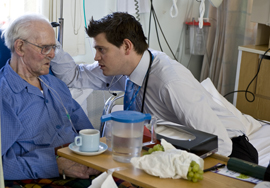Parkinson's Disease
What is Parkinson's Disease?
What is Parkinson's Disease?
 PD is a neuro-degenerative condition.
PD is a neuro-degenerative condition.
It progresses slowly over years.
The outward signs are due to a lack of dopamine in the cells of the basal ganglia – the movement control centre deep in the brain.
This causes stiff, slow movements, and often tremor. Gait may be difficult to start – or patients may "freeze" in doorways or when trying to turn
People depend on medication to counteract the lack of dopamine.
In the early stages of the illness, neurones can store dopamine and "buffer" any variations in drug blood levels. The medicine response is fairly constant, even if doses are late.
"On/Off" fluctuations develop when this "buffer" mechanism starts to fail.
The medicine response may 'wear off' if blood levels fall. Medication timing is crucial.
In more advanced "On/Off" fluctuations, dyskinesia may occur when the medication is working (i.e. when 'on'). Patients generally prefer to be 'on' with dyskinesia than 'off' but seek advice if persistent or severe.
Other nerve cells are affected, and other neurotransmitters too, and so PD is much more than a movement disorder.
Parkinson's Disease patients are vulnerable in hospital:
- Medication gets missed
- Mobility and stiffness gets worse in bed or without normal medicines
- Swallow function declines
- Nutrition at risk from poor hand dexterity and swallow
- Communication takes time
- Delirium is common
Call for help if your patient with PD is getting worse.
Zero tolerance for pharmacy code 4 in Parkinson's patients!

